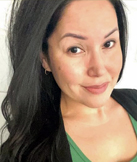
Trish Wilson “Blue Thunderbird Woman”

- Home Community:
Peguis First Nation - Cultural Identity:
Cree and Anishinaabe - Current Position:
Indigenous Academic Achievement Facilitator for the Portage La Prairie School Division - Education/Training:
Bachelor of General Studies, Brandon University - 2006
Bachelor of Education, Brandon University - 2008
Currently studying my Masters of Education in Guidance and Counselling, Brandon University - Graduation date in 2024 - Roles/Responsibilities:
I provide an important leadership role in looking after the on-going support to student support and resource teachers and classroom teachers regarding effective learning strategies for Indigenous learners. The presentations I deliver to all of our K-12 schools are; the 7 teachings, medicine wheel teachings, the blanket exercise, the Kakwa Replica Artifacts, Orange shirt day, Truth & Reconciliation, Gord Downie & Chanie Wenjack Fund, Indigenous Veteran’s day, MMIWG, Moosehide campaign, I love to read month, National Indigenous Awareness day, and much more.
I also assist in identifying professional development needs and match those with in-service opportunities. The current initiatives I am involved with are the Mamahtawisiwin Applying the Indigenous Education Policy Framework to the K-12 Classroom and the Treaty Education Catalyst Teacher Learning Network.
I also assist with school and Division planning, and coordinates the annual Division report on Indigenous Academic Achievement.
“I wanted better and to this day I still work diligently on breaking barriers in the systems I encounter.”
What obstacles did you face and how did you overcome them?
I grew up on the Peguis First Nation, a community that is located 200 km north of Winnipeg. Growing up on the reserve was challenging, most families lived in poverty and dealt with addictions. We did not have any community resources to assist with these challenges, however we had our family. Even though we did not have much at the time, my parents always made sure that our family was taken care of. After I graduated high school and at the age of 18, I had my daughter Amayra. Having a child at such a young age was extremely challenging, however it did not stop me from pursuing my goals of attending University. While I worked on completing my two degrees, my daughter spent the first 5 years of her life at the Brandon University Childcare centre. At the age of 23, I completed my Bachelor of Education and moved back to my community to teach high school.
What or who inspired you to really go after the profession you are in now?
My parents inspired me to pursue a career in education. My parents attended the Peguis Indian Residential Day school and they were faced with many challenges in the education system at the time. Despite their challenges, my parents valued education and they always motivated us to finish high school, graduate, and attend post-secondary. When I was working on my first degree I quickly realized that there was a lack of Indigenous representation on campus and in the classrooms. The Indigenous student population in urban schools was increasing. Therefore, I dedicated my studies to focusing on being an advocate for our Indigenous youth. Sixteen years later, here I am working as the Indigenous Academic Achievement Facilitator for the Portage La Prairie School Division.
What critical choices or decisions did you make that helped you get where you are today?
When I moved to Brandon University, I experienced a huge culture shock. Moving from the reserve, with my daughter, to the city was extremely difficult. I was one of a few Indigenous students in all of my courses and I felt very alone. My professors, at the time, were not inclusive and I had to deal with racist comments from my classmates. Every week I called my parents crying and I wanted to quit school. Although they were always supportive in whatever decision I made, I knew quitting was not an option. I had to finish and create a good life for myself and my young daughter. I also wanted to break the barriers that existed in the education systems and change the negative stigmas of being a young mother. I wanted better and to this day I still work diligently on breaking barriers in the systems I encounter.
Message of Encouragement:
As Indigenous people, we have the privilege of walking in both worlds. Whatever world you walk in, do it with the guidance and prayers from our ancestors, be humble, be open to new learning experiences, and more importantly be proud of who you are and where you come from.


